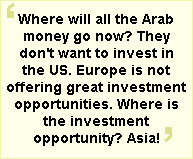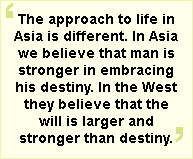
Home > Business > Interviews
The Rediff Interview/Shekhar Kapur
Shyam Bhatia |
November 06, 2003

Filmmaker Shekhar Kapur says the expanding infotainment market, estimated to grow to more than a trillion dollars in 10 years, has profound implications for India and Asia.
In the first part of an exclusive interview with Senior Editor Shyam Bhatia in London, Kapur said the Asian century has already arrived, but needs nurturing, guidance, and structure. In the second and concluding part, the accountant-turned-filmmaker explains further his theory of Asian cultural colonisation of the world, and the fantastic business opportunities to which it will give rise. Excerpts: Can you elaborate on the idea of reverse colonisation?Well, Bombay Dreams is one example. Miss World is another. Let's put it this way. When Miss World started and someone said to you that India would dominate Miss World, you would say yeah, yeah. It doesn't work like that. Miss World is supported by Indian advertising. If there is no Miss World from India for three years, that advertising will stop. Then what happens when Aishwarya Rai becomes Miss World? People start to believe that Indian women are the most beautiful in the world. It becomes a self-fulfilling prophecy, that's what cultural colonisation does. It works exactly like that. When it was Nicole Kidman or Penelope Cruz, it was the Western media going into overdrive. Here it was the Indian media where, because of the support of the advertising, because of Aishwarya Rai, she became Miss World, she became presented, Bollywood suddenly became hip. Today if you ask people who is the most beautiful woman in the world, I bet you Aishwarya Rai will be there. That's how it works.  Aren't we in India stumbling into a new world, whereas the West is much more sophisticated, more calculating in its marketing? Aren't we in India stumbling into a new world, whereas the West is much more sophisticated, more calculating in its marketing?
We are stumbling into it. If you look at the trends we are through individual actions and the collectivist actions of all individuals it is a trend that is going on and on and on. Then I come to the next question. When you say in the West there is a calculation, the calculation comes from a structure and an organisation, a corporation. What does not happen in India, and that is where the great business opportunity lies, is a corporation that says, 'Hey, we can accelerate this process, we can stake our claim right now.' Because that's exactly what we lack right now. Isn't there anyone in India who understands these basic realities that you have been talking about? I don't believe there is any corporation in Asia that has this whole vision and is taking it forward and saying, 'We can accelerate, we can grow with it, and we can create the next media dotcom that comes out of Asia.' There is Sony and we will talk about it later. Everybody now recognises Asia. The first attempt will be Western corporations to try and treat this as an extension of their product, a market that will extend their product and, yes, MTV will say yes, that's okay because we can do local programming. It doesn't work like that because the intention is not the same. The intention is to increase your shareholders' value and the shareholders' value is held mostly outside. That's where you go wrong. The Asianisation of these businesses will probably come from people who are Asian and who are happy to earn in rupees or earn in the progress and become part of the progress and the expansion of Asia. The only Asian corporation today that is very extensive in infotainment is Sony. At the last FICCI [Federation of Indian Chambers of Commerce and Industry] meeting I spoke about these figures and I talked to people about the possibilities. I even went into the detail of creating for them a plan, a ten-year plan. Mike Grindon is the head of international television at Sony. He was also speaking at the same thing and wrote me a note, saying every statistic, everything that you've talked about, is exactly the view of the chairman of Sony. This is exactly what he is saying and he is so frustrated with his team in LA who actually control the software of Sony that they don't get the future importance of Asia. That's the problem. It's an Asian corporation that understands Asia, is Asian, and is being run by Americans who have their own world view. The next thing is that investment in India, in China, in Asia is going to increase dramatically. Where will all the Arab money go now? They don't want to invest in the US. Europe is not offering great investment opportunities. Where is the investment opportunity? Asia! One of the things Mr Bush has done is accelerate this process. Through the Iraq war he has created a divide and that divide will only help Asia. That's what we saw in Cancun when all the Asian economies got together and Brazil joined in. I don't think it would have been possible if Iraq hadn't happened. That's my guess.  The big business opportunity now is for this big Asian corporation, or corporations, to come in and take a long-term view and see that if 70 per cent of the growth in revenues from the entertainment, infotainment, media business is coming from Asia, are we looking at out of US$1.3 trillion, at least $700 billion coming from Asia? If there is a $700 billion future market, how much of that comes from India? Can India take 30 per cent of that? Are we then talking about a $200 billion business that can come out of India? The big business opportunity now is for this big Asian corporation, or corporations, to come in and take a long-term view and see that if 70 per cent of the growth in revenues from the entertainment, infotainment, media business is coming from Asia, are we looking at out of US$1.3 trillion, at least $700 billion coming from Asia? If there is a $700 billion future market, how much of that comes from India? Can India take 30 per cent of that? Are we then talking about a $200 billion business that can come out of India?
You keep saying Asia as if it's some sort of homogenous mass. I think in Asia there is a huge amount of affinity between the different cultures. My thesis breaks down if that's not true, but if it's true, everything I am saying is going to happen soon. The approach to life in Asia is different. In Asia we believe that man is stronger in embracing his destiny. In the West they believe that the will is larger and stronger than destiny. These are two very different concepts. In Islamic countries there is a belief that man is stronger in embracing his own destiny. That defines the way we live, that defines our attitude to life. It's the factor that says stronger than my individuality is what is decided for me. You can call it God, kismet or destiny, but in finding our destiny we have got more power. That's one of the reasons why the Americans don't understand those September 11 hijackers. They didn't do it because they believe in 13 virgins. Everyone said they did it because they were promised these 13 virgins in the afterlife. They did it because they believed that if you find what you are supposed to do in life, then everything else falls away. You're telling me all this to explain the affinities within the Asian mindset. But even without the rest of Asia, the Indian market alone is huge. I know how well Hindi films do in China. The kinds of Hollywood films that do well in China are Harry Potter. Of course, in the Arab world, when I went to the Marrakesh festival, Amitabh could not, could not walk in the streets without security. He would get mobbed worse than he gets in Mumbai. As a government, as a society back in India, what can we do about this impending change? We need strategies to take advantage of this. We have to decide which city will become the centre of media in the next 10 years. Because if you are not careful it will be Shanghai. Could it be Mumbai or another Indian city? I think the corporations must start investing. What we don't have now is structure. The growth is happening in unstructured movement. It's boiling consumer demand and attitude that's pushing it without anyone at the top understanding what's happening. Nobody is pulling it. There's a push factor happening on its own, there's no pull factor. A pull factor that can happen with a large strategy and a corporation saying, 'If we set this, this, this up, and then open the floodgates, we are ready for a catchment area, we are ready to direct this place.' So basically what it needs is large investment, strategy, co-ordination. I have talked about this at the World Economic Forum, Indian film forums and I've talked to the Indian government, which totally agrees with me. This is superpower stuff?  Yes. Look, when you sell American culture, what follows? McDonald's. We don't buy McDonald's because we love McDonald's. It's because we aspire to a lifestyle. We buy Levi's because it's American culture. You buy McDonald's because it's American culture. Tourism follows. Yes. Look, when you sell American culture, what follows? McDonald's. We don't buy McDonald's because we love McDonald's. It's because we aspire to a lifestyle. We buy Levi's because it's American culture. You buy McDonald's because it's American culture. Tourism follows.
The Lord of the Rings increased New Zealand tourism by 30 per cent. Go ahead 10 years and see how everything Asian and Indian could become popular. Indian lifestyles, Asian lifestyles, could become popular because this is where everything will be marketed. It will be Indian glamour programmes like The Bold and The Beautiful with Indian models and the Indian scene. Sex and the City will be Indian. It will be watched in New York, that's what will happen. The Amitabh Bachchan 20 years from now will be a major megastar worldwide, possibly the world's biggest star. That's what's going to happen. Gucci and all these others won't be the big brands, the big brands will be Asian. You'll have an Indian brand that sells all over the world, Indian designers, Indian models, everything Indian or Asian. But you need structure for all that. Because if you don't, Western corporations will try and profit. Trust me, they know about this, they understand it, but they don't know what to do about it. Their attitude is, it's a market for them. I'm saying, 'No, they are a market for us.' There is the big difference and if you can do it in the entertainment business, all businesses follow, attitudes change. In summary, are you saying the Asia century is upon us and the defining issues of fashion, lifestyle, entertainment will all follow ?
Yes, because attitudes change. (Concluded)
|